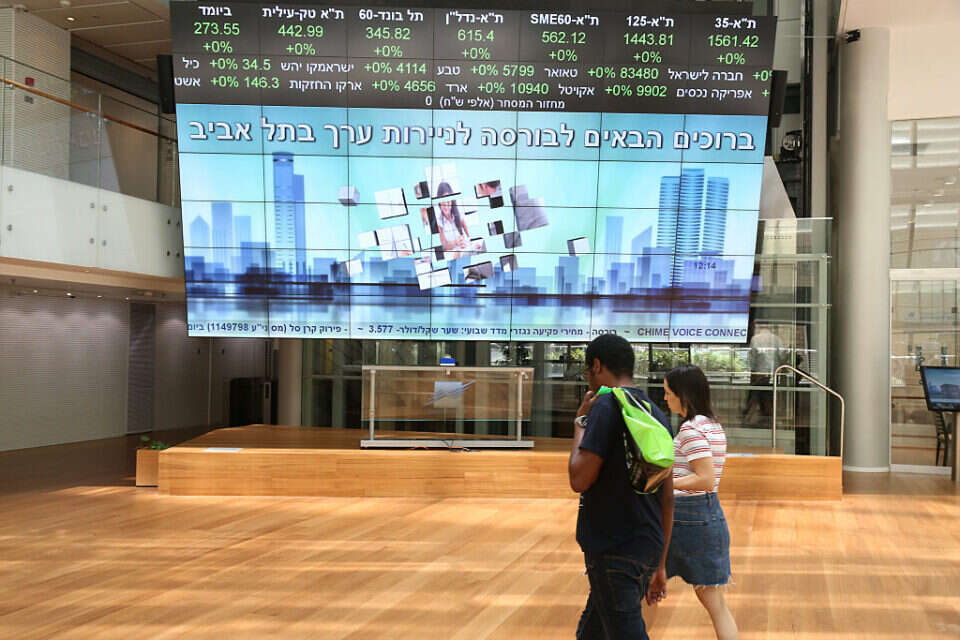The uncertainty in the political arena surrounding the legal reform in the first half of the year, along with the Iron Sword War that broke out in October, weighed on the Israeli stock exchange. This ended the year with slight gains, compared with the double-digit returns enjoyed by the world's leading indices.
New York Stock Exchange
Despite the upheavals, 2023 is nevertheless ending with cautious optimism for TASE: its flagship indices managed to record positive returns – the Tel Aviv 35 Index and the Tel Aviv 125 Index increased by about 4% each.
Migdal Capital Markets notes that globally, 2023 will be remembered as the year in which artificial intelligence broke into our lives, and one of the immediate derivatives of this was the rise of several shares of technology giants, which pulled the markets up with them. They also add that at the end of the year, investors in the US and other prominent stock exchanges in the Western world can be satisfied, in view of the pleasant price increases that have been recorded.
Bank of Israel, Photo: Oren Ben Hakon
Year-over-year, the Nasdaq jumped about 45%, and the S&P500 climbed about 25%. In Germany, the DAX is trading near its record high after rising almost 20% since the beginning of the year. France's flagship index, the CAC, is up about 15% for the year, and Japan's Nikkei is up about 30% this year.
Looking ahead, Migdal Capital Markets holds a positive view of the performance of the US market in 2024, noting that the main expectation is a relative calm in US inflation levels, and the beginning of a process of interest rate cuts. "The assumption that the Federal Reserve will announce interest rate cuts over the next year supported the positive trend in markets toward the end of 2023. This is expected to continue to support this positive trend into 2024."
Patience required
Migdal Capital Markets notes that "the war has a heavy economic price, and is expected to weigh on local economic data in 2024. There is still considerable uncertainty regarding the date of its end, the costs associated with it, and the possibility of escalation and expansion of the war to additional sectors.
"At the present time, patience is required. Despite the expected difficulties, we believe in the resilience of the Israeli economy and its strong foundation. For medium-term investors who are able to withstand volatility, the Israeli capital market is at a very attractive entry point relative to other markets around the world."
In the local capital market, Migdal marks the fields of infrastructure and real estate. In the field of infrastructure, they say, "the large-scale investments planned by the state in the development and initiation of projects are expected to receive an additional push forward at the end of the war, in view of the needs that will be created, which may provide companies in the sector with significant growth."
Regarding real estate, they add: "As far as housing is concerned, the period of stagnation will end at some point and people will return to buying apartments. The demand for new apartments in Israel exists – even if for a certain period, due to the uncertainty, activity in the industry has declined. In the yielding sector, after a challenging period, the declining interest rate environment will make it easier for companies to raise debt at lower cost and reduce their financing expenses, and will support results."
Ronen Menachem, Chief Market Economist, Photo: Mizrahi Tefahot Bank PR
A challenging year is ahead
Chief Market Economist at Mizrahi Tefahot, Ronen Menachem, believes: "2024 will challenge the stock market, which underperformed overseas markets in the past year. In order to assess where it is headed, it is necessary to adopt a working assumption regarding the continuation, scope and intensity of the fighting. On the one hand, it is quite clear that economic growth will be adversely affected, as will business sector activity. In contrast, in view of the decline in inflation in recent months, the interest rate is expected to decline, which will improve the availability of capital to businesses and the purchasing power of households. Under these circumstances, the end result will be influenced by economic sentiment: to what extent consumers will want to spend and companies to invest, and if as political-security uncertainty decreases, the domestic capital market will benefit."
Chen Herzog: "The cost of the war is expected to reach about NIS 190 billion, which is about NIS 65,<> on average for each family in Israel"
Regarding specific sectors, Menachem elaborates: "The income-producing real estate sector will benefit from the expected interest rate declines, but only at a later stage of the year. In addition, the natural gas partnerships enjoy financial stability, and the government has a clear interest in promoting gas exports, given the window of opportunity due to the sanctions imposed on Russia."
A change in priorities is needed
Chen Herzog, Chief Economist of BDO Consulting: "The stock exchange is the mirror of the economy, and therefore the economic costs of the war and the pace of recovery from it will have a substantial impact on the Israeli capital market in 2024. The cost of the war is expected to reach about NIS 190 billion, which is about NIS 65,<> on average per family in Israel.
Chen Herzog. "Subsidizing gasoline is contrary to economic logic", Photo: Nati Hadad
"The pace of recovery of the capital market in 2024 depends on a decline in the intensity of the fighting, but to a large extent also on economic policy and the budget. The government must bring about a change in national priorities, and formulate a budget that encourages growth, investment, and productivity in the economy. Formulating a pro-growth budget will also support an accelerated reduction in the interest rate, which can serve as a catalyst for economic growth and the capital market."
Wrong? We'll fix it! If you find a mistake in the article, please share with us

